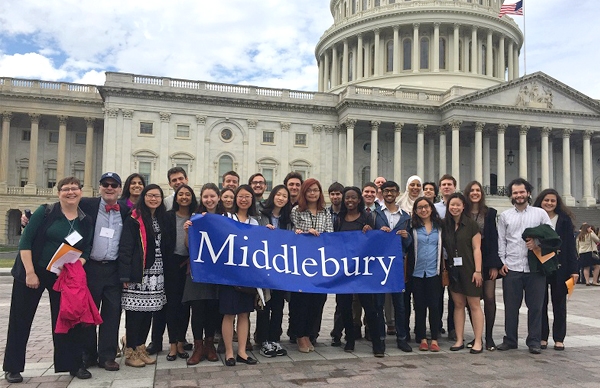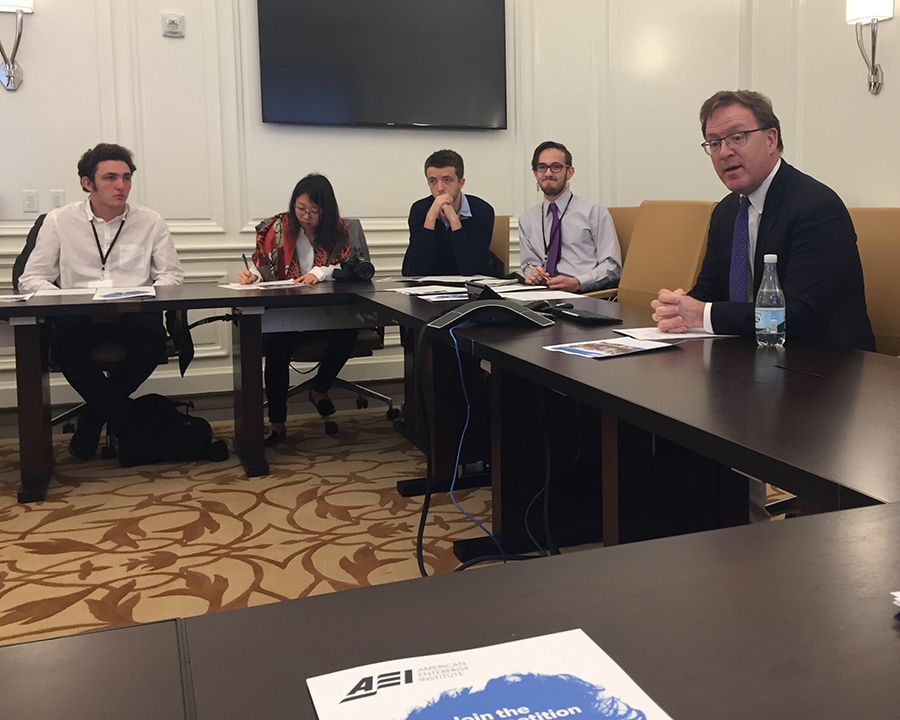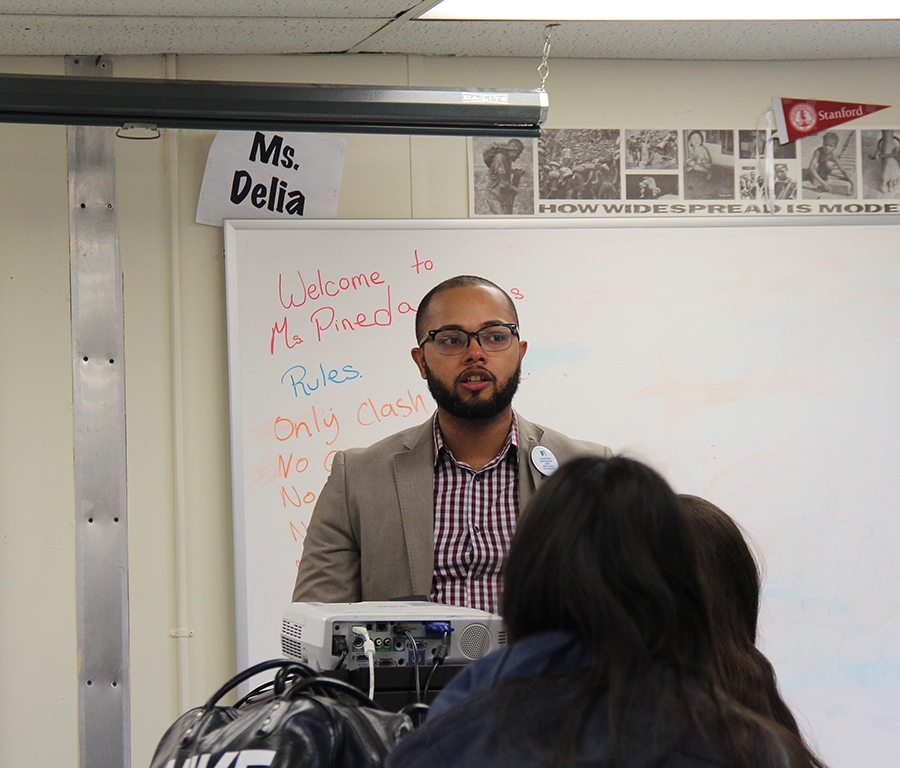Understanding Advocacy in Washington’s New Political Environment

MIDDLEBURY, Vt. – Instead of heading to warmer climes or going home for spring break, 24 Middlebury College students went on an “alternative spring break” trip to Washington, D.C., in March 2017 to learn how social policy is created and implemented in today’s divisive political environment.
The undergraduates met with representatives from six faith-based organizations in D.C., spoke with staffers for a nonprofit advocacy group and a conservative public-policy think tank, engaged with immigrant children at an international high school, and attended religious services of many faiths. Some students conferred with their elected representatives (or staff) at the Capitol, including Senator Bernie Sanders and Rep. Peter Welch of Vermont. They also networked with alumni at Middlebury’s D.C. office, and a student from Serbia headed a small delegation of undergrads who met with her country’s ambassador to the United States.
They were accompanied on the eight-day excursion by three chaplains from the Scott Center for Spiritual and Religious Life.
On the Wednesday immediately after the trip, the attendees gathered in Wilson Hall along with faculty, staff, students, alumni, and friends to reflect on what they experienced during their event-filled week in Washington. They were joined at the assembly by Cookie Tager, who earned an M.A. in French from Middlebury in 1966 and has generously sponsored three “Acting Righteously in Times of Danger” alternative spring break trips in honor of Pasteur Pierre and Helene Gagnier. The previous trips were to Montgomery, Ala., in 2015, and to Chicago in 2016.
Mark Orten, the dean of spiritual and religious life, opened the gathering in Wilson Hall by asking: How do you bring back such richness? How do you capture the in-depth and personal conversations that happened over dinners or on the 12-hour bus rides each way? How do you describe the proximity to power in the halls of Congress? How do we bring back all that we learned for meaningful discussion?
The answers to Orten’s questions would be found in the format of the late-afternoon program. Eight students spoke for three to five minutes each about their own experiences, and then all of the trip attendees sat down at round tables with guests to discuss the advocacy they have been involved in, and how the political environment in Washington is affecting the landscape for faith-based advocacy groups.

The first speaker, Matt Blake ’17, reflected on the sermon delivered by Imam Yahya Hendi at Jummah prayer at Georgetown University. “The imam referred to his childhood in Palestine where he and his friends would throw rocks at apricot trees so they would fall to the ground,” Blake recalled. “It was a metaphor for the Muslim response to acts of hatred. It is not to throw rocks. It is to give fruit.”
Shan Zeng ’19 said going as a group to Foundry United Methodist Church, to Jewish services with Hillel at Georgetown, and to Jummah prayer with the Muslim Student Association “really made me feel very welcome, very comfortable, and really opened me up to experiences I would not have otherwise had. It gave me so many entry points for further conversation.”
Celia Alter ’19.5 shared her impressions from meeting with a group of Young Evangelicals for Climate Action and observed how their religious beliefs help shape their social policy. “[The evangelicals] root their support for climate action in things like ‘love thy neighbor’ and ‘protect the Earth that God gave us.’ They have a unique position because progressive groups might cast aside evangelicals as not worth working with, when instead the two groups have fundamental similarities because of the evangelicals’ deeply held religious beliefs.”
Alaa Abdelfattah ’17 was struck by “the interesting contrast” between the ancient and the modern at the offices of Bread for the World, a Christian citizens’ movement to end hunger at home and abroad. On the one hand, she said, representatives of the organization were quoting from the story of Esther to explain “exactly why they are doing what they are doing,” while on the other hand they were all well dressed and worked in “extravagant surroundings” with a view of the Capitol out the window.
The next speaker, Charlie Cacciatore ’20, said he was a bit apprehensive about visiting the American Enterprise Institute since one of AEI’s resident scholars, Charles Murray, had been prevented from speaking on the Wilson Hall stage just a few weeks earlier. The AEI staff “accepted us,” the first-year student said, “and everyone on the trip was respectful. Some of us were a little concerned about what the reaction would be [but] it was great to see how an intellectual exchange [between resident fellow Robert Doar and Middlebury students] happened because everyone was willing to listen, ask questions, and challenge each other’s beliefs, which was wonderful.”

Ishrak Alam ’18 remarked that all of the organizations visited by the Middlebury delegation “displayed a real, fundamental passion for justice and for helping those in need of help. They all had different strategies and all focused on different issues, and yet despite their vast differences they all came from this place of caring and loving. It showed me that the ‘why’ is the most important factor in what makes an organization work and it gives an organization its identity.”
Audrey Pan ’19 marveled at how fluidly the students from the International High School at Langley Park (Maryland) interacted with the Middlebury undergraduates while playing soccer or engaging in problem-solving activities together. “When we think about education policy and how we can implement more diversity in our schools, we should build programs so students from different backgrounds can come together and work with one another in specific ways.” With Carlos Beato ’07 as principal, the school outside Washington, D.C., is one of 18 members in the nationwide Internationals Network for Public Schools that seeks to serve all “recently arrived immigrants.”
Varsha Vijayakumar ’20 said the visit to the international high school made her aware of her own privilege. “I had opportunities every step of the way to help me get to Middlebury. I was basically set up to go to college and I never had to think about it in a different way.” She observed that Principal Beato treated everyone as equals, and that he avoids defining students by numbers such as class rank, GPA, and SAT scores, which Vijayakumar found “really, really refreshing.”
In addition to Dean Orten, Chaplain Laurie Jordan ’79 and Associate Chaplain Ira Schiffer accompanied the students on the trip to Washington. They were joined in D.C. by Fariha Haque, the director of Middlebury in DC.
The trip was made possible by Cookie Tager MA French ’66, Les Blau ’69, Charlie and Marie Kireker, and the Scott Center for Spiritual and Religious Life.

